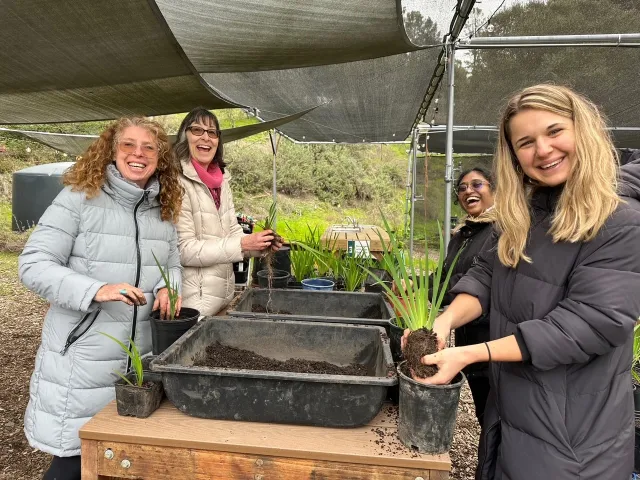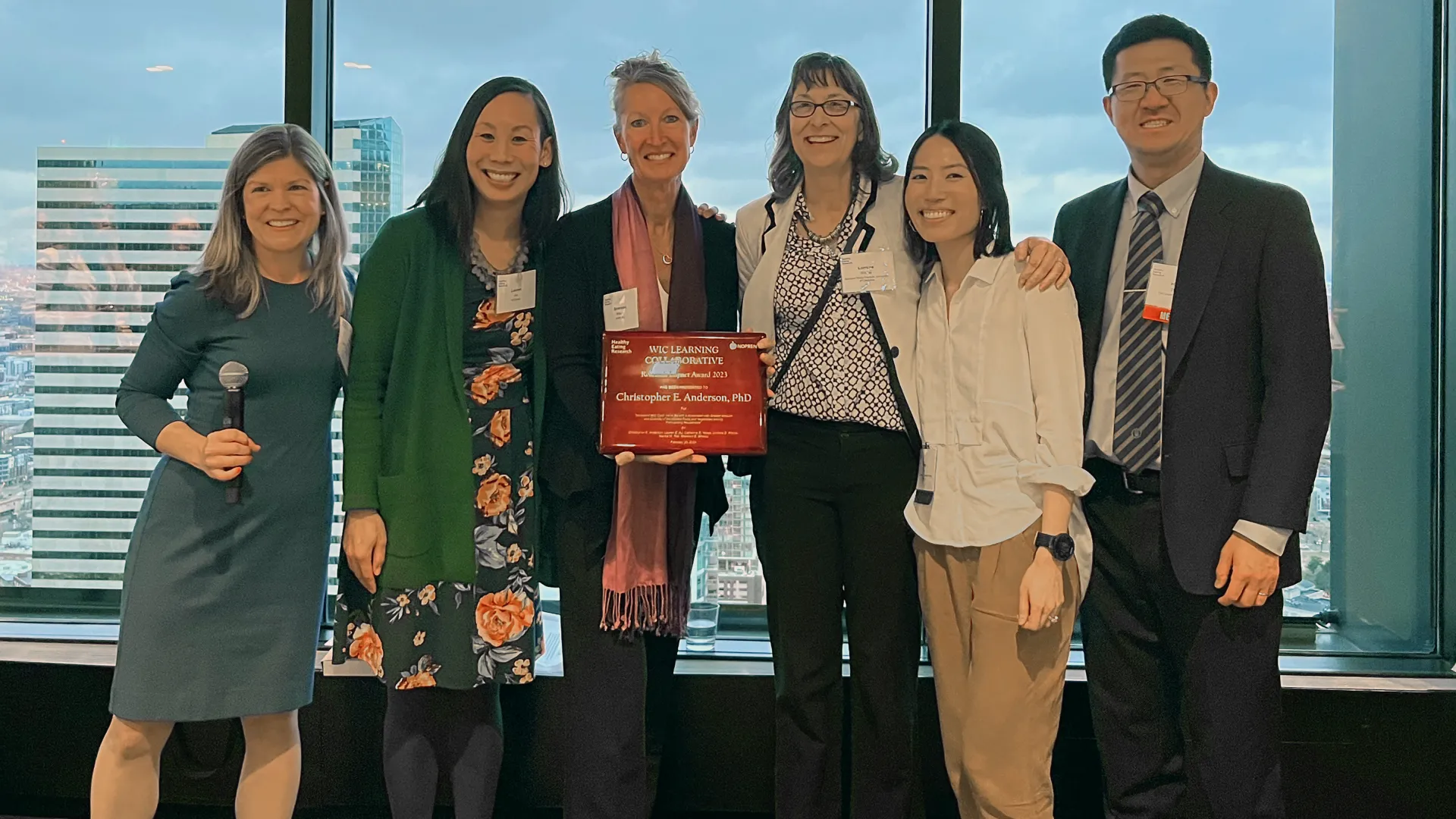Nutrition Policy Institute director pioneered impactful research, mentored young scholars
Public health nutrition research makes a measurable and meaningful difference for people across the country and around the world. That’s the message Nutrition Policy Institute Director Lorrene Ritchie wants students to know about her field. It’s also the only conclusion one can draw after reviewing Ritchie’s remarkable academic career.
“Lorrene’s work has always had public health impact,” said Mary Story, professor in family medicine and community health at Duke University School of Medicine. “She is one of the top public-health nutrition leaders and scholars in the country.”
Ritchie, who will retire from NPI on July 1 as its first and only director, has made – and continues to make – extraordinary contributions in the study of a wide range of nutrition programs, from universal school meals to the Special Supplemental Nutrition Program for Women, Infants and Children, better known as WIC.

WIC provides healthy foods, breastfeeding support, nutrition education and referrals to other services for pregnant, recently pregnant and breastfeeding women, as well as infants and children under 5 years old. Ongoing studies of WIC by Ritchie and her collaborators exemplify how rigorous scientific research can shape policies that tangibly improve lives.
“People don’t realize that half of the babies in this country are on WIC, as are about one-fourth to one-third of kids, zero to 5 years old,” Ritchie said. “You’re not just talking about a few people – you’re talking about millions and millions of families reached by the program.”
Thanks to insights from Ritchie and other researchers, the WIC program, administered by the U.S. Department of Agriculture, ensures the youngest members of society are getting essential nourishment. Over the years, the program has expanded the dairy package beyond milk and cheese to include yogurt, offered more opportunities for online nutrition education, and increased the Cash Value Benefit to allow families more choices in fruits and vegetables.
A study of that increase, which happened as an emergency response during the COVID-19 pandemic, revealed clear benefits for participants.
“We showed that increases in the Cash Value Benefit had all the positive outcomes that you would expect – more fruit and vegetable intake, people happier with the program – and that now is the national law of the land,” Ritchie said. “The Cash Value Benefit, even post-pandemic, was increased.”

‘How can I prevent people from landing in the hospital?’
Ritchie’s abiding interest in making a difference through research goes back to the beginning of her academic career. A first-generation college student, Ritchie graduated from San Jose State University, majoring in biochemistry. While working at a lab on Parkinson’s disease research, her mentors encouraged her to volunteer at Santa Clara Valley Medical Center to see if she wanted to pursue an M.D.
What she saw at the hospital convinced her to take a different path.
“Everyone was so sick and it occurred to me that trying to heal one person at a time – while noble and requiring incredibly smart people who are passionate and devoted – that wasn’t quite what I wanted to do,’” Ritchie recalled. “I thought: ‘How can I go more upstream and how can I prevent people from landing in the hospital?’”
After taking aptitude tests at San Jose State, she found that “nutrition” kept coming up as a potential path. Ritchie would go on to obtain master’s and doctoral degrees in nutritional sciences at UC Berkeley, and she eventually settled into a lecturer position at Berkeley and St. Mary’s College, teaching basic nutrition and medical nutrition therapy.
Then, three pioneers in the field – Joanne Ikeda, Sharon Fleming and Patricia Crawford – approached Ritchie about joining the new center they were launching, the Center for Weight and Health at UC Berkeley. Although Ritchie admitted not knowing much about childhood obesity prevention, she took a chance by pivoting away from her clinical nutrition roots.
“Pat Crawford was so passionate about public health and the opportunity to make big changes at the policy, environmental and systems levels – and a light bulb went off,” Ritchie recalled. “I was like, ‘This is it; this is what I want to do.’”

When the Center for Weight and Health was folded into NPI (a new institute created by UC Agriculture and Natural Resources) in 2014, Ritchie was named its first director.
Ritchie’s career reflects ‘cutting-edge ideas’
In its first 10 years, NPI has become renowned for its influential studies and innovative methods – hardly surprising given the originality of the research by its director.
Mary Story, a leading scholar in the field, is a professor at Duke University and serves as director of the Healthy Eating Research Program, a national program of the Robert Wood Johnson Foundation, which gives out competitive grants to improve child nutrition and reduce childhood obesity through policy, systems and environmental research.
Only 5% to 7% of grant proposals are funded, but Ritchie has been involved in about nine projects that have received research funding – an “incredible” number, according to Story.
“Over the years, we get very well-written proposals with strong methods – but they’ve already been done, or there’s already a lot of research in that area,” she explained. “Lorrene’s studies are always very novel and innovative, with cutting-edge ideas.”

Story pointed to Ritchie’s research on the Child and Adult Care Food Program, which provides food to young children in family child care homes and child care centers, similar to the school meal programs for school-aged children.
“Lorrene was one of the first to really look and delve into that area, and what we can be doing to improve children’s food at child care centers and homes,” Story said.
Consistent with her continual quest to trace the factors influencing health farther “upstream,” Ritchie found that research needed to focus on children before they began school.
“We realized we couldn’t wait until kids were school-aged to focus on nutrition,” she explained. “We needed to go earlier and earlier.”
That might be why Ritchie cites her research on WIC as the work she is most proud of.

“Adults can change and they do, but it’s much harder to change than to start from the beginning and build healthy eating habits that then are ingrained and not so easily influenced by the larger world,” Ritchie said. “You need to start at the start.”
WIC studies exemplify influential research
To better understand the long-term impacts of WIC on children and families from pregnancy onward, Ritchie brought aboard NPI’s first postdoctoral researcher, Lauren Au, to help with a groundbreaking, decade-long study.
“It’s well-known that WIC is an incredibly impactful public health program with a great return on investment – for every dollar you invest in WIC, you get $2.36 in impact,” Ritchie said. “But WIC has changed a lot over the years and understanding the long-term impact of WIC is really important, because kids can only be on it up until they turn 5.”
Later this year, Ritchie, Shannon Whaley at PHFE-WIC (a local WIC agency) and Christine Borger and other collaborators at Westat (a research firm) will publish the final report of their WIC Infant-Toddler Feeding Practices Study, which followed about 4,000 babies up until age 9.
“The exciting part is, even at age 9, we see some impacts on kids in terms of their family food environment from the lessons learned by those families,” said Ritchie, noting that caregivers who reported learning from WIC nutrition education were far more likely to have healthier food options in their homes, compared to those who did not report learning from WIC.

The in-depth expertise of Ritchie and NPI in the early-childhood nutrition space make them indispensable to the National WIC Association (NWA), a nonprofit that represents the interests of those who work in WIC and supports research and innovation across the program.
When COVID-19 forced significant changes to WIC, NWA and its partners saw an opportunity to take the pulse of WIC participants – gauging sentiment about pandemic-era adaptations (like remote learning opportunities and greater benefits for produce), as well as hearing their thoughts about the program overall.
“We immediately thought of the Nutrition Policy Institute as experts in conducting research in this space,” said Georgia Machell, president and CEO of NWA. “We knew that they had done a lot of work with participants in California, and so we were excited to expand that and get a national snapshot of how folks were feeling.”
That initial satisfaction survey and the follow-ups – a second survey garnered over 38,000 responses and the third is going out this year – are invaluable for NWA. The data offer insights on how participants’ needs evolve due to external factors (like the pandemic or economic shifts) and guide the nonprofit in pushing for positive changes to the program.

“We’re able to better understand the experience of the participants who engage with WIC, and that then helps inform how we should be focusing our efforts,” Machell said.
Regarding Ritchie as a role model, Machell said she admires how the NPI director always strives to consider the real-world implications of research findings.
“Lorrene brings a lot of humanity to what she does, which is something that doesn’t always exist in academic settings,” Machell explained. “She just cares so deeply about doing research that is helpful; I don’t think Lorrene has ever done research for the sake of research.”
“She’s an amazing human and has taught me a lot, and has taught countless others a lot as well,” Machell added. “I want to stress that it’s not just the teaching of book smarts – it’s the teaching of how to approach things, how to be open and collaborative.”
Ritchie shaped new approaches, next generation of scholars
Ritchie’s enduring legacy is represented not just in the vast breadth of her research projects – it’s also in how that work has been accomplished.
One key approach – which Ritchie learned from Pat Crawford and advanced through her leadership of NPI – is to involve, from the beginning of a study, the people who participate in the programs.
By engaging community members at every step, researchers can gather and highlight the lived experiences and other qualitative data that add a vital human dimension.
“That kind of data not only enrich our ability to interpret the quantitative findings, but they actually make an impact on decision-makers and policymakers,” explained Ritchie, who has testified before legislative bodies on nutrition programs. “Yes, facts and figures are important, but stories also matter.”

The importance of participant voices – as well as the benefit of public health scholars bringing their own experiences and perspectives to their research – are some of the lessons that Ritchie has conveyed to students and early-career academics.
“Lorrene has educated and mentored a whole next new generation of public health nutrition leaders and researchers,” Story said. “I think that will also be her legacy; there are so many challenges facing the field right now, and I think the work Lorrene has done – and who she has trained and mentored – are so critical for improving the health and well-being of children.”
Au, who went on to become an associate professor in the Department of Nutrition at UC Davis, credits Ritchie for demonstrating how to be a responsive mentor, such as creating opportunities for mentees to shine as “first authors” on papers and thus establish their own academic niche.
“Now, being a mentor for several graduate students and undergraduates, a lot of the strengths that I have are attributed to the mentors I had before me,” Au said.
Next month brings a “full circle” moment, as Au – Ritchie’s first postdoc at NPI – will be presenting with her mentor at Ritchie’s last conference as NPI director. In addition to sharing their WIC work at the June gathering of the International Society of Behavioral Nutrition and Physical Activity, Au said she also looks forward to celebrating Ritchie.
“On a personal note, what makes Lorrene stand out is she is incredibly caring – towards her staff and towards her students,” Au said. “She has a heart that she’ll just wear on her sleeve, forever.”

After that conference and her formal retirement, Ritchie said she plans to wrap up her outstanding research projects, spend more time with family and stay engaged in the public-health nutrition space. She is especially interested in working on ways to ensure the latest research is translated to effective policy – and that the “best and brightest minds” continue to choose public health nutrition and see the immense value and rewards of an academic career.
“Nurturing and leading with love and embracing diversity and enjoying who you work with – as much as what you work on – are all part of what makes this work really fulfilling,” Ritchie said. “Words are not enough to thank all the wonderful people I have learned from over the years; public health nutrition is really a team sport and I have had the privilege of being on some of the best teams.”
People interested in supporting Ritchie's legacy and the ongoing work in public health and nutrition can donate to the Nutrition Policy Institute’s Student Internship, which provides students from underrepresented groups the opportunity to work on NPI research and be mentored by NPI researchers.

